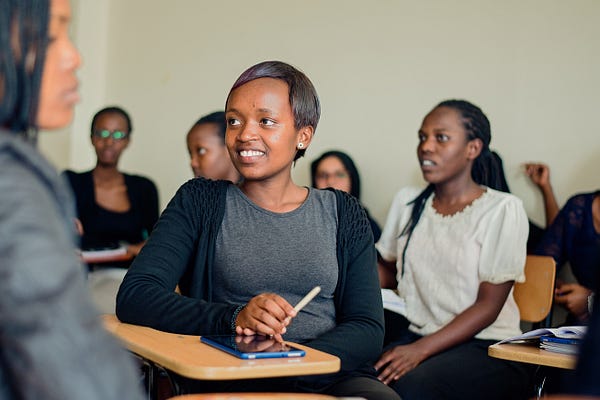Why Schools Should Embed Gender Equality in Their Curriculum
With the launch of our co-ed classes at Davis College, the Academics team released a Gender Responsive Pedagogy Handbook and professional development modules for all faculty.
We recently caught up with Ariel Jagusztyn, Assistant VP, Academic Programs, to learn more about what gender responsiveness looks like in a classroom setting and why it’s important for all students to be attuned to equality and equity.
—

The East African Community (EAC report, 2018), states that the quest for gender equality and women’s empowerment is critical for social, cultural and economic development processes, and that harnessing the power of both females and males is integral in maximizing equity and achieving sustainable development. In synergy with the African Union goals, the EAC launched a Gender Policy in 2018 that aimed at achieving “gender equality and equity through gender responsive sustainable development” (EAC 2018, p.28). Ultimately, this policy has the potential to improve quality of life by creating an inclusive community that guarantees equal rights and opportunities for women and men.
Just like its neighboring East African states, Rwanda is devoted to the gender equality agenda. Its political will to promote gender equality is visible through its commitment to at least 13 regional and international conventions, protocols on gender equality and women’s empowerment, and numerous legislative and policy reforms.
At Davis College and Akilah, classroom management is not just about disciplinary practices and behavioral interventions, but about a supportive learning environment for creating and managing behaviors. Our philosophical approach is to empower women while uplifting men through a gender responsive approach. This is achieved through sensitizing men on the importance of including women.
While globally women are becoming more educated, we must also consider the continued education of men. Undereducated men can prove to have societal consequences. In our classrooms, students develop conclusions and realizations for themselves through discussion and an open and inclusive atmosphere. The goal of supporting teachable moments on gender in the classroom is not to come to a consensus of ideas but to realize the differences in ideas, notions, and conceptions of gender and gender-roles in cultures and in homes.
To model fairness and social justice, our curriculum is conscious of the emerging issues arising from differences in gender. A gender-responsive curriculum values and respects diversity. It promotes equal opportunities by helping to break down gender stereotypes and hierarchies. It encourages students to challenge preconceived ideas, narrow concepts and prejudices relating to their understandings of gender (BE-UNESCO, 2017). It recognizes the effect of gender on young people’s identities as learners, as consumers of knowledge and skills, and relays content in a way that differentially mediates learning and ultimately the learner’s attainment.

There are always teachable moments that arise during class discussions. For example, a healthy debate about whether or not to use a memo when firing an employee may evolve into whether the person writing the memo is male or female. We turn such moments into episodes of discovery in which we excite student curiosity and question the biases regarding male/female bosses.
Davis College instructors use gender responsive language that portrays men and women as equal partners and provides a conducive learning environment for both. Gender biases can be consciously or unwittingly reinforced through language. It is vital for instructors to re-examine the kind of language — verbal or non-verbal — they use for inherent biases, to ensure that it is gender responsive.
Furthermore, some of our courses incorporate gender studies units. In leadership courses regarding community leadership and social change, there are entire units specifically dedicated to gender studies and women’s empowerment, which also explore gender equality and equity. Such units contain a selection of materials on gender including articles from Rwanda’s constitution in regard to gender and human rights.
Courses like Bridge English also include literary texts that set grounds for discussions on gender. Such texts include The Number 1 Ladies Detective Agency and Things Fall Apart. These texts portray female and male lead characters whose actions mirror the reality of African society and its gender issues. The books create rich conversation starters that guide students into realizing and questioning their own attitudes and biases toward a given gender, and allow them to deconstruct what they know in order to assume new stances about gender.
As part of the Business Communication course, students either read Rania Anderson’s The Undeterred text, that teaches the principles followed by successful business women and how to be empowered, or WE: Men, Women and the Decisive Formula for Winning at Work, which teaches that increasing gender diversity in workplaces does not lead to fewer opportunities for men, but rather increases production and profits. Ultimately, students learn to value diversity and to focus on growing skills and talents rather than thwarting each other’s efforts.

The learning opportunities regarding gender responsiveness are also extended to our faculty and were formalized with the release of our Davis College Gender Responsive Pedagogy Handbook last year. Gender responsive training provides educators with the relevant knowledge, skills and values that allow them to contribute to the effective implementation of the gender-mainstreaming strategy in their classes (European Institute for Gender Equality, 2016). Educators who have gone through gender responsive training demonstrate the following key skills:
Value equally the learning ability of both female and male students
Facilitate both female and male students’ abilities to learn, progress equally, and develop their potential to the fullest
React cautiously to unfriendly and potentially gender-biased attitudes that students may demonstrate toward their female and male peers
Help students question gender-biased attitudes in order to prevent them from happening in the future
Look for characteristics/behaviors resulting from social norms that may hinder academic learning and performance (e.g., shyness, arrogance, dominance, bullying, lack of confidence, and fear of speaking out in class)
To be able to embody the skills faculty acquire when they go through the training, it is important for educators to be open minded to reshaping their individual attitudes that tend to favor one gender over another. The gender responsive pedagogy training and professional development opportunities will be delivered to all faculty at Davis College (both current and new). The modules for the training include:
Module 1: Actions and limit
Module 2: Understanding and sensitizing toward ideologies, expectations, and stereotypes
Module 3: Reflection and Being Non-Positional
Faculty training and continuous professional development in responsive pedagogy at Davis College aims at bridging the gap through sensitizing faculty to gender issues and making them aware of their own attitudes to be able to reject gender stereotypes and respond effectively to the needs of their learners.
—
Join our community of lifelong learners who are committed to creating an equitable and sustainable future for all!
Prospective students can apply online: https://www.daviscollege.com/apply
To become a monthly donor and contribute to our students’ tuition, please visit: https://www.daviscollege.com/donate
